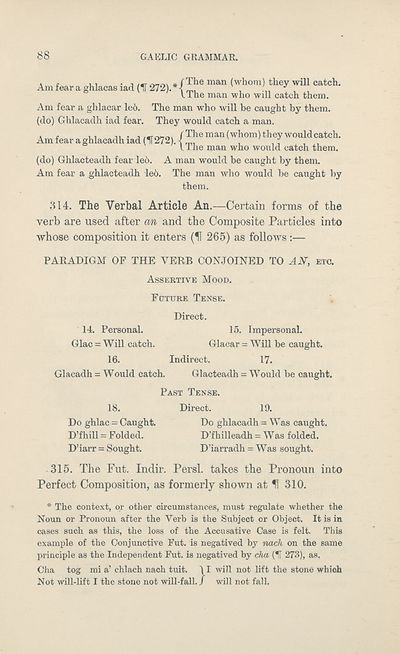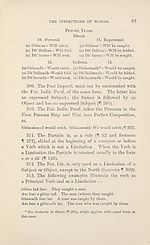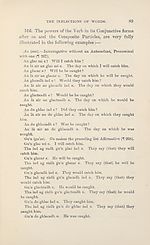Download files
Complete book:
Individual page:
Thumbnail gallery: Grid view | List view

88
GAELIC GRAMMAR.
Amfearaghlacasiad(ir272).»{^e mM1 (^°m) they will catch.
\The man who will catch them.
Am fear a ghlacar le6. The man who will be caught by them,
(do) Ghlacadh iad fear. They would catch a man.
,n (whom) they would catch,
m who would catch them,
(do) Ghlacteadh fear le6. A man would be caught by them.
Am fear a ghlacteadh le6. The man who would be caught by
them.
Am fear a ghlacadh iad (IT272). j ™
314. The Verbal Article An.—Certain forms of the
verb are used after an and the Composite Particles into
whose composition it enters (H 265) as follows:—
PARADIGM OF THE VERB CONJOINED TO AN, etc.
Assertive Mood.
Future Tense.
Direct.
14. Personal. 15. Impersonal.
Glac = Will catch. Glacar = Will be caught.
16. Indirect. 17.
Glacadh = Would catch. Glacteadh = Would be caught.
Past Tense.
18. Direct. 19.
Do ghlac = Caught. Do ghlacadh = Was caught.
D’fhill = Folded. D’fhilleadh = Was folded.
D’iarr = Sought. D’iarradh = Was sought.
315. The Fut. Indir. Persl. takes the Pronoun into
Perfect Composition, as formerly shown at H 310.
* The context, or other circumstances, must regulate whether the
Noun or Pronoun after the Verb is the Subject or Object. It is in
cases such as this, the loss of the Accusative Case is felt. This
example of the Conjunctive Fut. is negatived by nach on the same
principle as the Independent Fut. is negatived by cha (IT 273), as,
Cha tog mi a’ chlach nach tuit. \I will not lift the stone which
Not will-lift I the stone not will-fall. / will not fall.
GAELIC GRAMMAR.
Amfearaghlacasiad(ir272).»{^e mM1 (^°m) they will catch.
\The man who will catch them.
Am fear a ghlacar le6. The man who will be caught by them,
(do) Ghlacadh iad fear. They would catch a man.
,n (whom) they would catch,
m who would catch them,
(do) Ghlacteadh fear le6. A man would be caught by them.
Am fear a ghlacteadh le6. The man who would be caught by
them.
Am fear a ghlacadh iad (IT272). j ™
314. The Verbal Article An.—Certain forms of the
verb are used after an and the Composite Particles into
whose composition it enters (H 265) as follows:—
PARADIGM OF THE VERB CONJOINED TO AN, etc.
Assertive Mood.
Future Tense.
Direct.
14. Personal. 15. Impersonal.
Glac = Will catch. Glacar = Will be caught.
16. Indirect. 17.
Glacadh = Would catch. Glacteadh = Would be caught.
Past Tense.
18. Direct. 19.
Do ghlac = Caught. Do ghlacadh = Was caught.
D’fhill = Folded. D’fhilleadh = Was folded.
D’iarr = Sought. D’iarradh = Was sought.
315. The Fut. Indir. Persl. takes the Pronoun into
Perfect Composition, as formerly shown at H 310.
* The context, or other circumstances, must regulate whether the
Noun or Pronoun after the Verb is the Subject or Object. It is in
cases such as this, the loss of the Accusative Case is felt. This
example of the Conjunctive Fut. is negatived by nach on the same
principle as the Independent Fut. is negatived by cha (IT 273), as,
Cha tog mi a’ chlach nach tuit. \I will not lift the stone which
Not will-lift I the stone not will-fall. / will not fall.
Set display mode to:
![]() Universal Viewer |
Universal Viewer | ![]() Mirador |
Large image | Transcription
Mirador |
Large image | Transcription
| An Comunn Gàidhealach > An Comunn Gàidhealach Publications > Scottish Gaelic as a specific subject > (92) |
|---|
| Permanent URL | https://digital.nls.uk/125956121 |
|---|
| Description | This contains items published by An Comunn, which are not specifically Mòd-related. It includes journals, annual reports and corporate documents, policy statements, educational resources and published plays and literature. It is arranged alphabetically by title. |
|---|
| Description | A collection of over 400 items published by An Comunn Gàidhealach, the organisation which promotes Gaelic language and culture and organises the Royal National Mòd. Dating from 1891 up to the present day, the collection includes journals and newspapers, annual reports, educational materials, national Mòd programmes, published Mòd literature and music. |
|---|---|
| Additional NLS resources: |
|

